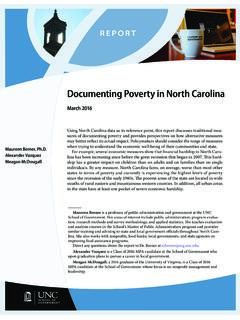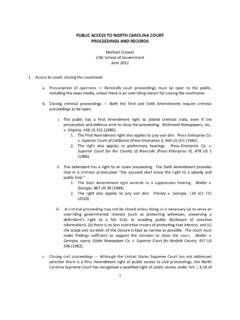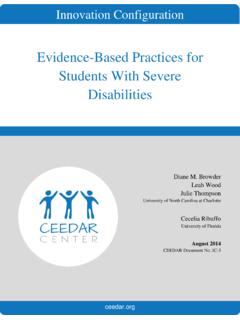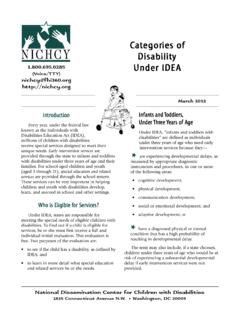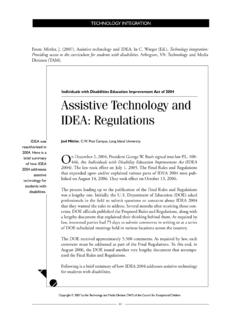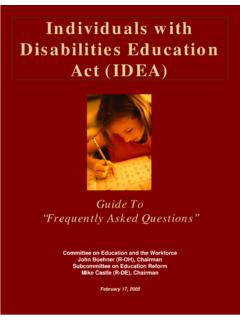Transcription of The Individuals with Disabilities Education Act (IDEA)
1 The Individuals with Disabilities Education Act (IDEA) Citations: 20 1400 et seq 34 Part 300 et seq NC 1500: Policies Governing Services for Children with Disabilities (Amended October 2013, by NC Department of Public Instruction Purpose of IDEA: Ensuring equality of opportunity, full participation, independent living, and economic self-sufficiency for Individuals with Disabilities . 20 USC 1400(c)(1) One Sentence Description for 3-21 year olds: IDEA is a federal entitlement program for children who have a qualifying disability such that they receive a free appropriate public Education in the least restrictive setting through the provision of special Education and supportive services as designated in their individual Education programs. What is a Disability Under IDEA? There are 14 categories of disability under the federal IDEA and the disabling condition must not only exist but it must require that the student need special Education and related services.)
2 Most of the disability categories also require that disability cause an adverse effect on the student s educational performance. (34 ) Autism Traumatic Brain Injury (TBI) Visual Impairment including blindness Emotional Disability (ED) Specific Learning Disability (SLD) Other Health Impairment (OHI) Speech or Language Impairment Orthopedic Impairment Hearing Impairment including deafness Deaf Blind Intellectual Disability (ID) (formerly Mental Retardation) Multiple Disabilities (MD) Deafness Developmental Delay [in only children 3 7 , See (2)] Students identified with a disability under IDEA receive specialized instruction and supportive services that are reasonably calculated to lead to an educational benefit. Education includes academic, functional and developmental skills, thereby looking beyond academic performance. Students eligible under IDEA are entitled to a Free Appropriate Public Education (FAPE) [20 1412(a)(1); (a)] in the Least Restrictive Environment (LRE) [20 1412(a)(5); (b)(2)].
3 (d). Every student receiving services under IDEA must have an annual Individual Education Program (IEP). Decisions regarding evaluations, eligibility (and under what disabling condition), services (type, frequency and duration), location of services (LRE) and manifestation determinations, in disciplinary removals exceeding ten (10) school days in one school year are made by the IEP Team. Parents are equal participants of the IEP Team. 20 1414(d)(1)(B)(i); 1414(e) and 1415(b)(1); 34 CFR ; NC (c)(2); NC ; NC Decisions are made by consensus. If consensus cannot be reached, the school administrator conducting the meeting makes the decision. Parents have procedural due process rights giving them standing to appeal IEP Team decisions regarding eligibility, services (FAPE), location of program (LRE), and manifestation determinations. The due process procedures involve stand alone mediation, a complaint process, or an administrative hearing, with the right to appeal the hearing decision to state or federal court.
4 20 1412(a)(6)(A); 1415(d)(2). In addition to these procedural protections for parents on behalf of their children, parents must provide informed consent for evaluations. 20 1414(a)(1)(d)(i)(I) and 1414(c)(3); NC 1503-1(a); NC 1503-1(c). Evaluations must use a variety of assessment tools to gather relevant functional, developmental, and academic information about the student and must include information provided by the parent. NC (b). Parents have a right to request an independent educational evaluation (IEE) at public expense if they disagree with the school district s evaluation of their child (20 1415(d)(2)(A); NC ). Parent may provide an evaluation that was not obtained in the special educaiton referral process, and that evaluation must be considered by the school district if it meets the district s criteria. NC (c). Parents must also give consent for the initial provision of special Education services and can revoke consent for the receipt of special Education services for their children at any time.
5 20 1414(a)(1)(D)(i)(II); NC 1503-1(b)(1), NC 1503-1(b)(4). 34 CFR Because a parent is an equal participant in the IEP team, the parent must be provided advance notice of the meeting, and the meeting must be scheduled at a mutually agreed on time and place. NC (a). A parent may participate by alternative methods, such as video or telephone conference. 34 CFR ; NC (c); ; (c)(3). If the parent does not attend, the school district must maintain a record of its attempts to arrange a mutually agreed on time and place. NC (d). REFERRAL Parents or school personnel who suspect a child has a disability may refer the child for special Education by providing a written referral to a school administrator or teacher that states the reason for the referral and addresses his or her specific concerns and the child s current strengths and needs. NC If an oral request is made by the parent, the school shall assist the parent in completing a written referral.
6 NC (b). EVALUATION The district must ensure that a student who is referred for special Education and related services receives a comprehensive evaluation in all suspected areas of a disability. 20 USC 1414(b)(3)(B)) Think FAD Functional, Academic and Developmental Evaluations must also include information about the child that is provided by parent. 20 USC 1414(b)(2)(A). A copy of the evaluations must be given to the parent prior to the IEP Team meeting. 20 USC 1414(b)(4)(B). A parent may also provide outside evaluations of the child to the school district in order to allow the IEP Team to consider that information when it is making determinations regarding needed evaluations, eligibility, IEP services and placements, and manifestation determinations for the child. 20 1414(c)(1)(A)(1); NC (a)(1)(i). DISMISSAL FROM SPECIAL Education In order to dismiss a child from special Education eligibility, the school must reevaluate the child pursuant to the evaluation procedures under IDEA.
7 20 USC 1414(c)(5)(A); NC (e). In reviewing the reevaluation, the IEP Team must determine that the student no longer qualifies as a student under IDEA. The student may still have a disability but may not requires special Education and related services. Graduation/Age Out Eligibility for special Education and related services in North Carolina ends upon high school graduation or the school year in which the student turns 22, whichever occurs first. When a student graduates with a regular diploma or ages out, the schools must provide the student with a summary of his/her academic achievement and functional performance, including recommendations on how to assist the child in meeting his/her post-secondary goals. 20 USC 1414(c)(5)(B)(ii). WHO IS THE PARENT/DECISION-MAKER FOR CHILDREN IN DSS CUSTODY? A parent is defined as the natural, adoptive, foster parent [unless state law prohibits the foster parent from serving as a parent, NC (a)(2)], legal guardian (but specifically prohibits the State if the child is ward of the State), or an individual who is legally responsible for the child s welfare or who is acting in the place of a natural or adoptive parent.
8 20 USC 1401(23). North Carolina prohibits therapeutic foster parents from acting as such. NC (d)(1). If the child is a ward of the state, a surrogate parent must be appointed to act as the parent, with all the rights, responsibilities and protections afforded by IDEA to a parent. 20 1415(b)(2)(A); 34 (a)(3); NC (g). The definition of parent includes a surrogate parent who has been appointed as such pursuant to procedures under IDEA. (14)(e); (a)(5). A surrogate parent is someone acting in place of natural/adoptive parent who the child lives with , or who is legally responsible for the child. The role of the surrogate parent is to protect the rights of child and one is appointed when: the child s parents are unknown or cannot be located after making reasonable efforts, the student is a ward of the state and the parents rights have been terminated or their rights to make educational decisions have been terminated by the court, or the child is an unaccompanied homeless youth.
9 NC (a). Appointment The surrogate parent must be appointed within 30 calendar days of when the school district is aware that a surrogate parent is needed. 20 1415(b)(2)(B); 34 (h); (c)(3); NC (h). A surrogate parent may be appointed one of two ways: 1. by the judge overseeing the child s care (court order in A/N/D action) See: 20 1415(b)(2)(A)(i); 34 (c); NC (c), or 2. by the educational agency [16 NCAC ; NC (b)] Criteria for selection of surrogate parent require that the surrogate parent Has no personal or professional interest that conflicts with the interest of the child the surrogate parent represents; and Has knowledge and skills that ensure adequate representation of the child. 34 (d)(2)(ii) and (iii); NC (d)(2) and (3) Although DSS has legal custody under a District Court Order and makes decisions and consents to services for a child in its custody, DSS directors and case workers cannot be the surrogate parent for special Education purposes under IDEA.
10 The surrogate parent shall not be an employee of the State educational agency, the local educational agency, or any other agency that is involved in the Education or care of the child. 20 1415(b)(2)(A); 34 (d)(2)(i); NC (d)(1). In addition, although 7B-903(a)(2)(c) authorizes a DSS who has a child in its legal custody as a result of a disposition after an adjudication of abuse, neglect or dependency to arrange for, provide or consent to educational evaluation or treatment, DSS cannot do this in the context of special Education matters for that child as a result of the federal law. See Attorney General Thornburg Opinion dated March 12, 1986 addressing the conflict between state and federal law. NOTE: These provisions do not prevent a DSS case worker from being an IEP Team member. 20 1414(d)(1)(B)(vi). Consent and Wards of the State For initial evaluations only, if the child is a ward of the state and does not reside with a parent, the LEA is not required to obtained informed consent from the parent if the LEA cannot locate the parent after using reasonable efforts to do so or the rights of the parents to make educational decisions have been removed by a judge, and the consent for initial evaluation was given to an individual appointed by the judge to represent the child.
